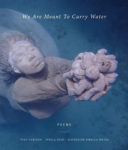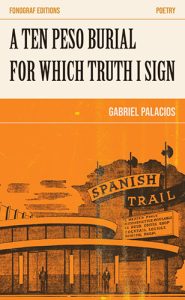‘We Are Meant to Carry Water’ by Carlson, Reed, and Dibella Seluja
Guest Post by Kimberly Ann Priest
“Are we only bone, skin, and urge?” asks the speaker in The Great Square That Has No Corners. I am beginning to wonder if the answer to that question is affirmative. Yes. As I write this, I am sitting in my living room on a Tuesday afternoon in October, mid-way through another semester teaching, and realizing that, this autumn, I have over-committed myself . . . again.
As projects begin to pile up and my network grows, while responsibilities increase and my own poetry demands that I give it more of my attention, I have to let some things go. After four years reading and writing about new works by various authors and publishers, this will be my last review for NewPages. It’s time, once again, to listen to my body and check my urges. And, how fitting that I should end my review history with a review of a collaborative manuscript by three clearly very talented women who have written an elegant collection of poems on assaulted womanhood—a topic that continually shows up in my own work. Drawing from mythology, Tina Carlson, Stella Reed, and Katherine Dibella Seluja have woven a modern (though not modernized) conversation between Helen, Leda, and Lilith, and they have done so with such precision, such tastefulness, such raw beauty.
“What lives in me?” asks Helen in Helen. “The quick heart of birds just flown,” she answers, “a pear.” In these poems, three women search for the sources of their internal stressors, leading them to excavate histories, contemplate lineage, and reshape injuries. “Because I have no mother / but the god who shaped me / from mud,” admits the speaker in Bladed with Bone & Glass, “I am hard as the spike, the fault line / the cliffed fall of the mob / into rivers.” “I am afraid of this air / beaten by shadow,” laments another in The River Empty of Swans, “its collision with skull / and thighs, wishing an owl’s head / to see clearly over my shoulder.” And still another asserts:
I need to break open. These prayers constrict.
My eyes water them. My feet dance away in the woods.
My heart makes a wound where I can crawl out,
rise intact into the scorching sun.
The impact of these discoveries and pleas haunt me. As a woman who has survived too much assault in one lifetime, I feel them deep in my bones. I too want to rise intact, to sense hyper-vigilance dismantling, fear dissipating, the ground beneath me softening as though tender to my feet. Sometimes I hear myself recanting do not forget that I am dust—a note-to-self drawn from Biblical poetry because, once again, I need to soothe the parts of me that are fragmenting, spiraling downward under the weight of too much personal pain.
In these old stories, the collective voices of women speak the same. In Letter to the Midwife Constantine, the speaker unburdens her soul with: “How could I know the searing pain? Hours, miles, millennia / rocking back on the green waves of the sea.” Giving birth and being birthed are metaphors for grief. These waves that come unexpectedly as a child at the moment it is brought into the world. These waves that constrict and constrict and demand all of a body’s effort to push until the moment of relief. “Know this, young migrant,” asserts the speaker in After I Lost Everything:
We all share
the same heart,
broken in a mythical garden,
sent out to wander and sing.
Migrant, mother, daughter, friend chorus their exile. Myth marries myth to say that the wound is shared throughout history and womanhood—generation to generation, body to body. “We are water heavy,” explains the speaker in the book’s title poem, We Are Meant to Carry Water:
collapsing wells,
thick water pumps
through chest holes,
skiffs slip down spackled
rivers churning silt,
lake-eyed child, her rod
in the depths wishing.
So, “[t]his is your task:” commands the speaker in My Tears Could be Wine, “when the ocean is a bed of glass . . .”
and your head a blaze of light,
remember your grandmother’s hair,
the long white story of it
pulled with rosemary.
Remember her songs.
Dream back the vineyards,
the sleeping grapes at night,
moon silver in their leaves.
remember what your mother told you
after a full night of labor
to bring you to earth:Then the sun came up and made everything right
and you were born.
When all is bone, skin, and urge . . . and tears. When all is heavy with grief and the fire of traumatic pangs are burning through the body . . . remember this chorus. Remember the ancient story of womanhood—her howl, broken whispers, and propensity to keep moving on. Remember the lineage. Remember the songs.
And remember that “ . . . Mother was found / hanging from a tree over the river” says Helen in Helen Questions the Reason for War. But why? Because some of our sisters die by this wound. Rape, molestation, incest, and their aftermaths teach some to weave “braided rope around / [the] throat.”
But above the roar of social movements like #metoo and the broken spirits of women departed to pain, are these stories eloquently attesting to a collective energy, defiance, and care among women who reel with fragmented memories of assault—flashbacks, isolation, depression, dissociation, fractured relationships, and the list goes on. “Why, I ask you,” pleads Helen, “can a war not be waged over this?”
It can.
Perhaps less important than waging a war against perpetrators and oppressors is the war I hear waged in these pages—the one for the indominable migrating female spirit. She is worth fighting for. We are worth fighting for. For these stories passed on and the raw beauty of women supporting one another: sitting with grief, acknowledging chaos, and pulling collective weight forward into hope for mythical consolidation and relief.
This book sings that hope and I am relieved. Of all the books I’ve read and reviewed for NewPages these past four years, this is, by far, my favorite. At 91 astonishingly beautiful 9×7.5” pages with photographic inserts of The Nutmeg Princess—an underwater sculpture at the Grenada Underwater Sculpture Park, Grenada, West Indies—this book is worth its cost in dollars and time. With this book, that Jennifer Militello calls “female, but not feminine,” begin your journey into a spiritual and mythical recovering of the fierce and the wild by first beginning “the dismantling,” of those things we should not carry. Let these poems float shame and fear to the surface where it can be whisked away.
Listening to my own body, also still consolidating its stories of assault and, gradually, healing from each symptom contained therein, I must do some dismantling myself, put reviewing aside, and return to my own poetry. Each time I write, I too surface shame and soothe another layer of suffering. Thank you, Tina, Stella, and Katherine for bearing this pain with me and carrying it upward through water.
We Are Meant To Carry Water by Tina Carlson, Stella Reed, Katherine DiBella Seluja. 3: A Taos Press, March 2019.
About the reviewer: Kimberly is the author of White Goat Black Sheep (FLP) and her poetry has appeared in several literary journals. She is an MFA graduate of New England College, an editor for the Nimrod International Journal of Poetry and Prose and an Assistant Professor of First-Year Writing at Michigan State University. Her writing explores trauma, sexuality, violence against women, motherhood, and displacement. To read more of her work visit kimberlyannpriest.com.





